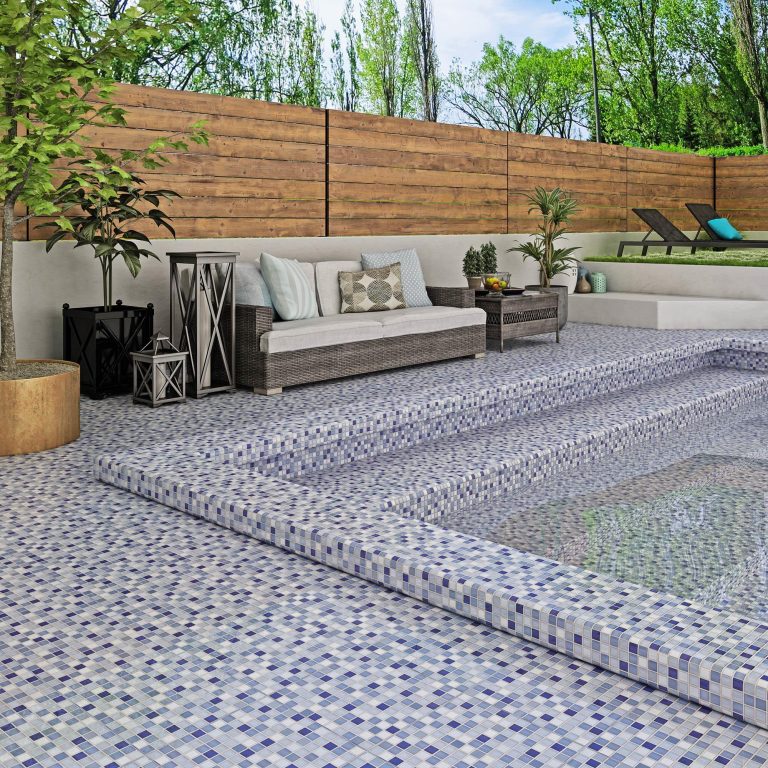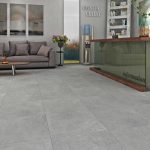A swimming pool is one of the healthy and recreational places that bring vitality and freshness to people, so choosing the right tile for the floor and wall of the pool is of particular importance. There are different types of swimming pool tiles that can be made in the desired shape and color according to the model and design of the swimming pool. According to the use of the pool, tiles with water absorption below zero should be used for its floor and walls, ordinary tiles have water absorption above zero, so they are not suitable for swimming pools. In addition to its role in beauty, the selection of pool tiles is also effective in the maintenance and durability of the pool, because over time, sediments in the water such as calcium and other minerals will be deposited on the walls of the pool, which will create a white shadow on the work surface. It is not easy to make this shade, but by choosing the right tile, you can prevent the deposition of these materials. Suitable pool tiles include the following:
Glass pool tiles: These types of tiles are very suitable because of their design and light absorption. Installing glass tiles requires time and precision, and the cost of using this tile is higher than other types of tiles, but the result will be unique.
Porcelain tiles: Porcelain tiles are the most common type of tile used for swimming pools. This tile has a high density that is very strong against water and weather changes. High strength, easy installation, high variety of styles and colors, no water penetration and easy maintenance of this tile have made it more popular.
Mosaic tiles: These tiles have special designs and colors that make the pool more beautiful. This model, like the two examples above, has sub-zero water absorption, which does not get damaged in the vicinity of water.
Pool tiles behind the mesh: these tiles have high resistance in all weather conditions. They are not harmed in cold, heat, humidity and rain. To know the price of pool mesh tiles, contact our experts to guide you.
Ceramic suitable for swimming pool
The ceramic that is used for the pool should have zero water absorption, like the pool tile. Another important point in choosing the right ceramic for the pool is its resistance to freezing, if the ceramic does not have this feature, it will easily separate from the work surface with weather changes. If you don’t use the right ceramic for the pool, it will cause damage during the pool drainage and cold seasons by freezing and absorbing water, which can cause financial loss or other risks. Ceramics suitable for swimming pools are generally divided into the following four categories:
Ceramic swimming pool with ceramic material: this model is used in most swimming pools. This type is suitable for pools that have an irregular and concrete design. These ceramic materials are glazed and have high strength.
Pool ceramics with glass material: This type of ceramic is made with glass glaze and has more electricity than other types of pool ceramics. This model is often used for pool walls.
Swimming pool ceramic: This ceramic is made of porcelain, which prevents water penetration. Ceramic pool design is suitable for pools that have specific and symmetrical shapes and dimensions.
Pool ceramics with marble material: this type of ceramic can be used for the floor and wall of the pool. Marble ceramics are mostly used for personal and home pools. This ceramic material has a special beauty that gives the space a more luxurious effect.
Glass pool tiles: These types of tiles are very suitable because of their design and light absorption. Installing glass tiles requires time and precision, and the cost of using this tile is higher than other types of tiles, but the result will be unique.
Porcelain tiles: Porcelain tiles are the most common type of tile used for swimming pools. This tile has a high density that is very strong against water and weather changes. High strength, easy installation, high variety of styles and colors, no water penetration and easy maintenance of this tile have made it more popular.
Mosaic tiles: These tiles have special designs and colors that make the pool more beautiful. This model, like the two examples above, has sub-zero water absorption, which does not get damaged in the vicinity of water.
Pool tiles behind the mesh: these tiles have high resistance in all weather conditions. They are not harmed in cold, heat, humidity and rain. To know the price of pool mesh tiles, contact our experts to guide you.
A swimming pool is one of the healthy and recreational places that bring vitality and freshness to people, so choosing the right tile for the floor and wall of the pool is of particular importance. There are different types of swimming pool tiles that can be made in the desired shape and color according to the model and design of the swimming pool. According to the use of the pool, tiles with water absorption below zero should be used for its floor and walls, ordinary tiles have water absorption above zero, so they are not suitable for swimming pools. In addition to its role in beauty, the selection of pool tiles is also effective in the maintenance and durability of the pool, because over time, sediments in the water such as calcium and other minerals will be deposited on the walls of the pool, which will create a white shadow on the work surface. It is not easy to make this shade, but by choosing the right tile, you can prevent the deposition of these materials. . Suitable pool tiles include the following:
Ceramic suitable for swimming pool
The ceramic that is used for the pool should have zero water absorption, like the pool tile. Another important point in choosing the right ceramic for the pool, m
It is resistant to freezing, if the ceramic does not have this feature, it is easily separated from the work surface due to weather changes. If you don’t use the right ceramic for the pool, it will cause damage during the pool drainage and cold seasons by freezing and absorbing water, which can cause financial loss or other risks. Ceramics suitable for swimming pools are generally divided into the following four categories:
Ceramic swimming pool with ceramic material: this model is used in most swimming pools. This type is suitable for pools that have an irregular and concrete design. These ceramic materials are glazed and have high strength.
Pool ceramics with glass material: This type of ceramic is made with glass glaze and has more electricity than other types of pool ceramics. This model is often used for pool walls.
Swimming pool ceramic: This ceramic is made of porcelain, which prevents water penetration. Ceramic pool design is suitable for pools that have specific and symmetrical shapes and dimensions.
Pool ceramics with marble material: this type of ceramic can be used for the floor and wall of the pool. Marble ceramics are mostly used for personal and home pools. This ceramic material has a special beauty that gives the space a more luxurious effect.
What type of tile is suitable for a swimming pool?
Important points about choosing pool tiles
Pool tiles have more contact with water than bathroom tiles, so you should be careful in choosing them. In this section, to help you make a better purchase, we point out important points regarding the selection of pool tiles: As mentioned above, these tiles must have sub-zero water absorption so that water does not penetrate them in any way. The tile must have a high resistance to freezing (especially for swimming pools), otherwise the tile will be easily separated from the work surface due to weather changes. There are many differences between pool tiles and regular tiles, and you can get the right model for your pool by paying attention to some simple tips when buying. One of the easy ways to identify a pool tile is to pour a few drops of water on the back of the tile (the back part is not glazed), water is absorbed in normal tiles, but in pool tiles you can see that the water drops remain on the surface and are not absorbed. It is better to wait a few minutes and make sure that no water is absorbed. It is better to choose a pool tile that has a glossy glaze because no material will deposit on it. The tile is suitable for use in the pool if its chemical properties are stable and do not cause damage to the body over time.







